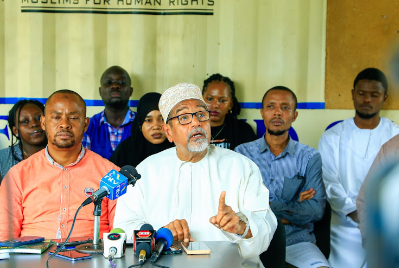The muguka debate in Mombasa is becoming increasingly contentious, pitting religious leaders against each other and potentially setting the stage for another conflict between the government and civil society.
Some Muslim leaders support the ban on muguka, while others criticize their fellow sheikhs for focusing on muguka and ignoring other hard drugs affecting Coast youth.
On Friday, two human rights groups—Muslims for Human Rights (Muhuri) and Human Rights Agenda (Huria)—threatened to defy the court order suspending the ban imposed by Mombasa, Kilifi, and Taita Taveta counties on the sale and use of the stimulant.
Yusuf Lule from Huria praised Mombasa Governor Abdulswamad Nassir for initiating the muguka discussion, criticizing the proposed Senate Bill seeking to declassify miraa as a drug as hypocritical.
Senate Deputy Speaker and Meru Senator Kathuri Murungi has sponsored the Narcotic and Psychotropic Substances Amendment Bill, 2023. He pointed out that although miraa is listed as a crop in the Crops Act of 2013, Nacada and other agencies still classify it as a drug.
On Friday, Lule remarked, “We see a conflict of interest and want to mobilize and rally our communities and politicians within the Coast region to ensure they speak directly to this particular Bill.”
Lule warned that removing the core ingredients of miraa and muguka, cathine and cathinone, from the list of intoxicants would significantly hinder the fight against drug abuse in the Coast and Kenya.
He also criticized the Embu court’s decision to lift the muguka ban in the Coast, citing a conflict of interest since Embu leaders have been advocating for the ban’s removal due to the crop being grown in their area. Lule urged Coast politicians to be more vocal on this issue.
Muhuri executive director Walid Kassim and director Khelef Khalifa likened the impact of muguka on the Coast to the impact of alcoholism on the Mt. Kenya region.
“We call upon our leaders to stand firm and ensure the health, social and economic effects of muguka to the Coast community does not destroy the youth any further,” Kassim said.
He said it is sad political leaders have gone back to party lines to support stances that are detrimental to the youth.
Khalifa said the high price of miraa is deterrent to most youth but muguka is cheap and readily available, affecting even primary school pupils.
“Science has proven that miraa and muguka are drugs. That is why it is banned in most of Europe and even neighbouring Uganda,” he said at Muhuri Legal Aid clinic.
He said the argument of Meru and Embu residents that they have lived with and used muguka for many years and nothing has happened to them, is foolhardy.
“There are people who have been using bhang and cocaine and nothing has happened to them. Should these also be made legal because of that?” he posed.
He said the Coast has for ages been treated as a colony and time has come to stop that.
“This is a drug and our kids have been affected. All these gangs are because of such things like muguka. When they chew it, they lose their heads,” Khalifa said.
“Abdulswamad, close all borders. Do not let muguka come to Mombasa, court order or not. Because we are the affected people, we can defy the court order. Our interest and the health of our kids is more important than the court order.”
The activists said President William Ruto’s move to give Meru and Embu farmers Sh500 million for value addition of the miraa and muguka is “hypocritical and unfair”.
“As the father of the nation, he shouldn’t have done that. The best thing would have been to call both parties to the table, not one party,” Lule said.
He remarked that the country’s problem lies in prioritizing economic issues over health and morality concerns. Nominated Senator Miraj Abdillahi criticized the ban on muguka as biased. She argued that the ban should also be extended to miraa and other substances that intoxicate coastal youth.
“If we are to ban muguka, we should not leave out miraa. Why are we being unfair and biased against one party and leaving out the other?” she posed.
This stance was interpreted by some Muslim clerics as supporting the lifting of the ban on muguka, contrary to the wishes of Coast residents. Sheikh Abu Hamza criticized Senator Abdillahi, stating that her opposition to the ban was akin to supporting the chewing of miraa, a claim that Abdillahi denied.
Meanwhile, other Muslim clerics, led by Sheikh Yusuf Suleiman, defended the senator. They argued that she was expressing her genuine opinion, which should not be publicly criticized by religious leaders. Sheikh Suleiman emphasized that as a religious leader, Sheikh Hamza should have privately rebuked Senator Abdillahi instead of doing so publicly.



